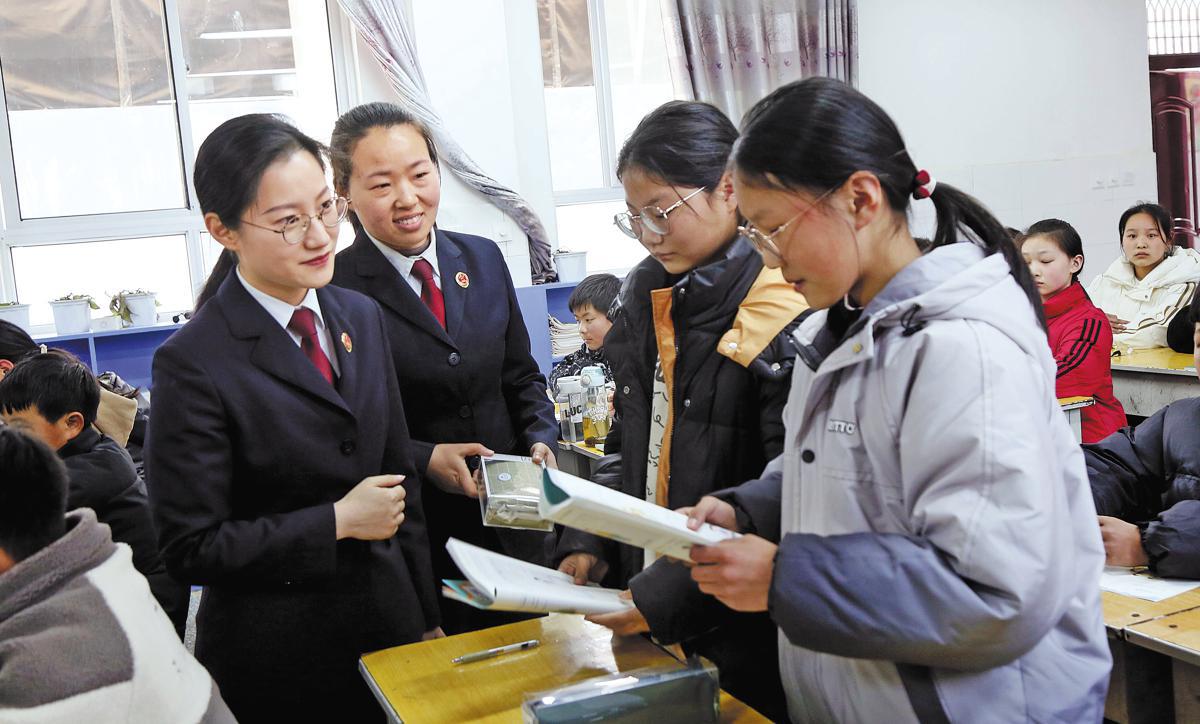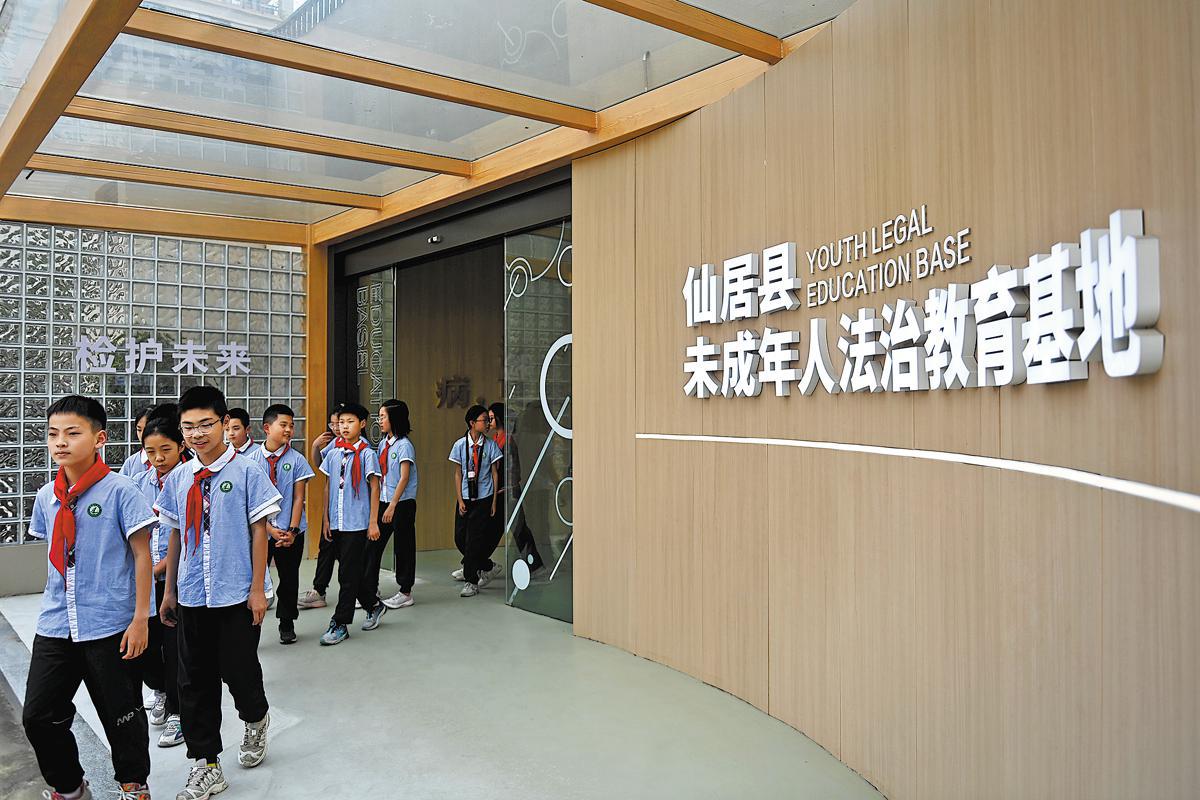
Prosecutors discuss ways of preventing campus violence with students at an elementary school in Ruyang, Henan province, in March. KANG HONGJUN/XINHUA
The recent prison terms handed to two teenagers who killed their classmate in Handan, Hebei province, have sent ripples across China, once again sparking a national discussion on the prevention of juvenile crime and child protection.
At the end of December, the Handan Intermediate People's Court sentenced the pair, one to life in prison and the other to 12 years behind bars, for intentional homicide. A third child who was present but did not take part in the planning or the carrying out of the crime was given specialized rehabilitation.
The killing shocked the country, as the perpetrators and the victim were just 13 years old when the case happened, while details released in the ruling have prompted people to further think about issues related to school bullying and left-behind children behind.
According to the verdict, on the afternoon of March 10 last year, a teenager surnamed Zhang deceived his classmate Wang into going to a greenhouse after plotting to kill him with another teenager surnamed Li, who also went to the greenhouse with another boy, Ma, who was unaware of the plan.
After their arrival, Zhang began attacking Wang with a shovel, while Li was responsible for restraining Wang. In the midst of the attack, Ma left the crime scene, and Zhang and Li continued beating Wang to death, then burying his body in the greenhouse. Later, the three fled the scene on bikes.
Zhang divided the money on Wang's mobile phone with Li, and asked Ma and Li to smash and dispose of it.
Upon realizing that Wang was missing, his family turned to the police. Ma confessed to the offense during the investigation and took police to the crime scene.
The court also revealed that Zhang and Li had conflicts with Wang, and planned to kill him and take his money, adding that it was Zhang who chose the abandoned greenhouse as the crime scene where he took shovels ahead of time to bury the body.
Chinese media had previously reported that Wang had been bullied by the perpetrators, and that all the minors in the case lacked parental companionship, let alone family supervision and education.
"It's an individual case, but needs our deep reflection to figure out why it happened," said Fang Yan, a lawyer at JT&N Law firm.
She praised the intensified efforts by governmental and judicial authorities last year to prevent juvenile crime, such as specifying anti-bullying measures and providing stronger care for left-behind children. However, she added, more joint efforts are still needed.

A police officer demonstrates self-protection skills for students in Huaian, Jiangsu province, in March. ZHAO QIRUI/FOR CHINA DAILY
Anti-bullying measures
Considering a number of juvenile crimes originate from school bullying, China has attached greater importance to the issue, with more specific and practical measures put in place.
In May, the Ministry of Education required each primary and middle school to establish an anti-bullying committee responsible for determining acts of bullying and handling them.
Schools should formulate rules that specify disciplinary measures or different kinds of bullying behavior, the ministry said, adding that an anti-bullying hotline and email address need to be made available.
It urged every class to hold at least two anti-bullying sessions per semester and teach students about preventing bullying, specifying that surveillance cameras should placed in corridors, on rooftops, in storage rooms and other acceptable locations on campus.
The same month, the Supreme People's Court, China's top court, unveiled a specific guideline to strengthen juvenile protection and crime prevention measures, calling on judges to focus more on handling cases involving school bullying.
The 42-article guideline mandates the identification of bullying during other child-related cases and to promptly notify schools or training institutions to arrange interventions, ordering courts to follow up on how the education departments address the issue.
It allows courts to determine an infringement based on the severity of school bullying and the degree of physical or mental harm to victims, stressing that if bullying has constituted a crime, the perpetrators need to be held criminally liable.

A prosecutor guides elementary school students on a tour of the procuratorate's section for juvenile crime in Huzhou, Zhejiang province, in July. HUANG ZONGZHI/XINHUA
Left-behind children
Left-behind children have also been a major target receiving attention, because they may easily take a wrong turn due to insufficient care and supervision.
Last year, Chinese civil affairs regulators completed a comprehensive survey of left-behind and vulnerable children nationwide, with files established and long-term support, especially psychological aid, provided for those at risk, according to the Ministry of Civil Affairs.
Data released by the Chongqing Civil Affairs Bureau in December showed that it organized more than 2,100 activities for left-behind children in the municipality last year, and began a three-year project to improve services for minors with 13 other authorities, including education departments and the women's federation.
A total of 4,030 psychological counseling rooms have been opened in primary and middle schools citywide, serving more than 4 million students, the data said.
The guideline issued by the top court urged courts at all levels to care more about left-behind children and to give them judicial assistance to prevent them from being lured, manipulated or forced to commit crimes.

Elementary school students tour a youth legal education base in Xianju, Zhejiang province, in May. HUANG ZONGZHI/XINHUA
Child abuse
While strengthening the prevention of juvenile crimes, China's child protection has also been enhanced.
Yao Jialei, a prosecutor from Beijing's Dongcheng district, said that the majority of cases in which minors were victims last year involved sexual assault, including those who committed the crime via the internet.
In one case, for example, a father reported to police after finding his 13-year-old daughter was lured to send naked videos and photos to two men on WeChat between December 2022 and January 2023.
Yao said that the suspects were quickly indicted on the charge of allegedly molesting children, adding that the efficient handling of the case was due to a judicial interpretation specifying circumstances in which people who sexually abuse minors online should be prosecuted.
Before the interpretation was enacted, people who encouraged juveniles to undress online or requested naked pictures or videos were difficult to prosecute because no physical contact had been made.
"But after the interpretation took effect, the confusion in legal practice has been removed," Yao said.
"Considering the girl in the case had little awareness of self-protection, we also offered her and her family legal education and counseling services," she added.
The top court reaffirmed that people who sexually harm children would face harsher punishment with "zero tolerance". Three child abusers and rapists were executed in November.
One case showed that a former primary school teacher surnamed Guo was discovered to have raped six girls who were all under 14 years old, over 100 times from 2013 to February 2019, and molested three others under the age of 12 multiple times.
"Left-behind children in rural areas and minors with mental problems were more likely to be the criminal targets of sexual abuse," the top court said, revealing that many criminals raped or sexually abused juveniles after luring them on the internet.
Cyber protection
Since the beginning of last year, a State-level regulation that tightens supervision on children's internet use came into effect, aiming to ensure a healthier online environment for minors.
According to data released by the China Internet Network Information Center, China had 196 million netizens under the age of 18 as of December 2023, with the internet penetration rate among the group increasing to 97.3 percent from 93.7 percent in 2018.
The regulation not only calls for government agencies to provide more benefits for internet users, but also requires quick responses to pressing issues, such as harmful content, personal information leakage, internet addiction and cyberbullying.
As the country ramps up cyber protection through administrative measures, the Beijing Internet Court has also stepped up efforts to help juveniles surf the web in a healthy manner by opening a tribunal to specialize in resolving child-related civil lawsuits.
Since it was established in May 2021, the tribunal has heard more than 700 cases, 86.4 percent of which were settled through mediation, according to Zhao Ruigang, vice-president of the court.
"We increased communication with minor litigants to alleviate their anxiety and intensified guidance for their parents while tackling the disputes, especially those related to online gaming, pornography and cyberbullying, so as to effectively protect minors' rights in cyberspace," he said.
"We've also sent judicial suggestions to internet platforms with irregularities, urging them to optimize real-name registration systems and tighten the monitoring of online content, he added.
The court has published a series of comics and mini-dramas aimed at increasing online safety awareness in minors, which have been viewed more than 3 million times, said Sun Mingxi, a senior judge from the court.
She added that two reports, one for guiding teenagers to sensibly support pop stars and the other focusing on cyber protection, have also been viewed more than 15 million times.
The two court officials emphasized the importance of legal education for children, saying that it is conducive to both the prevention of juvenile crimes and child protection. They suggested more social organizations join in the education drive, so that more information can be collected to enrich the content of comics and dramas.
caoyin@chinadaily.com.cn